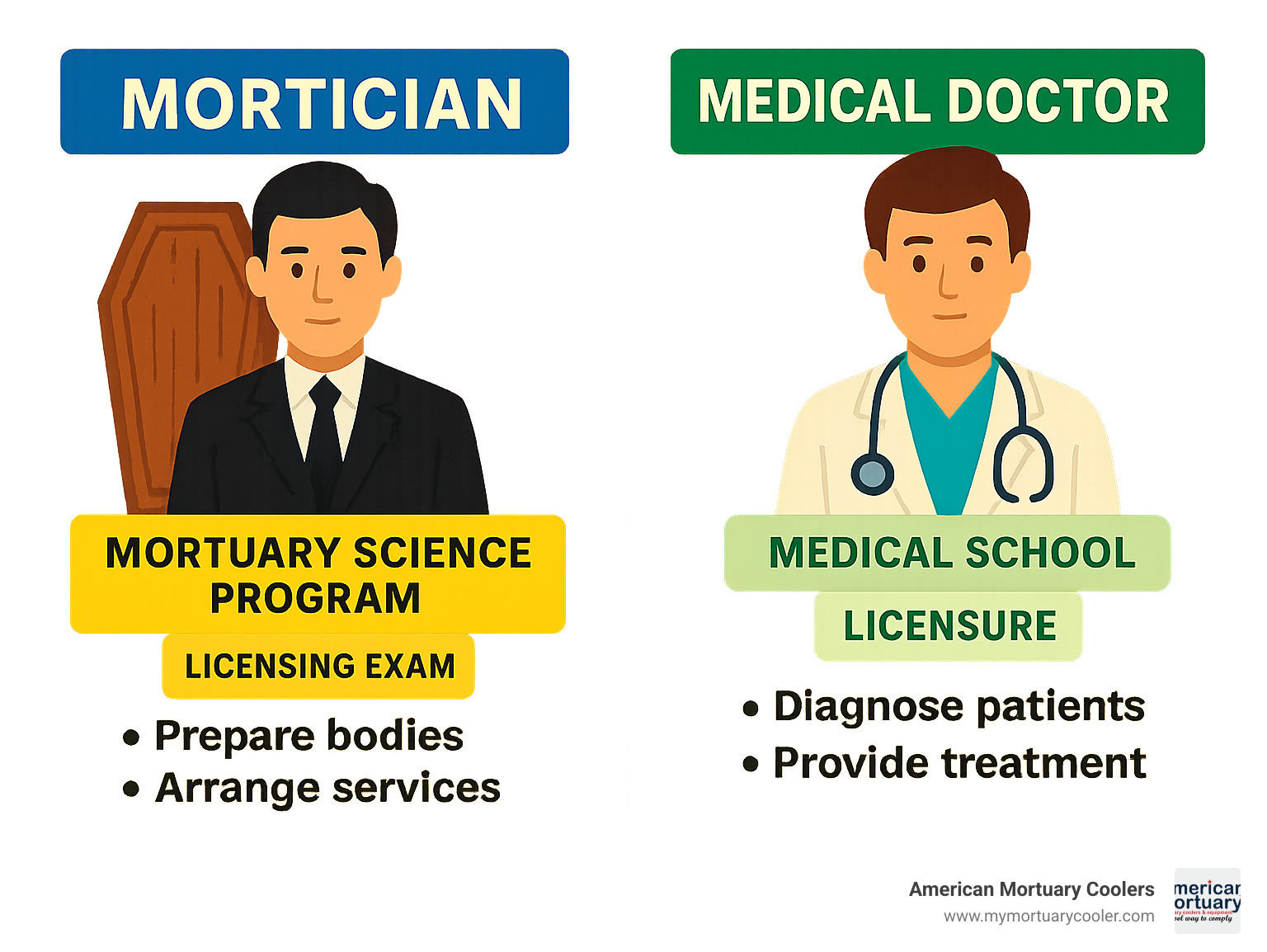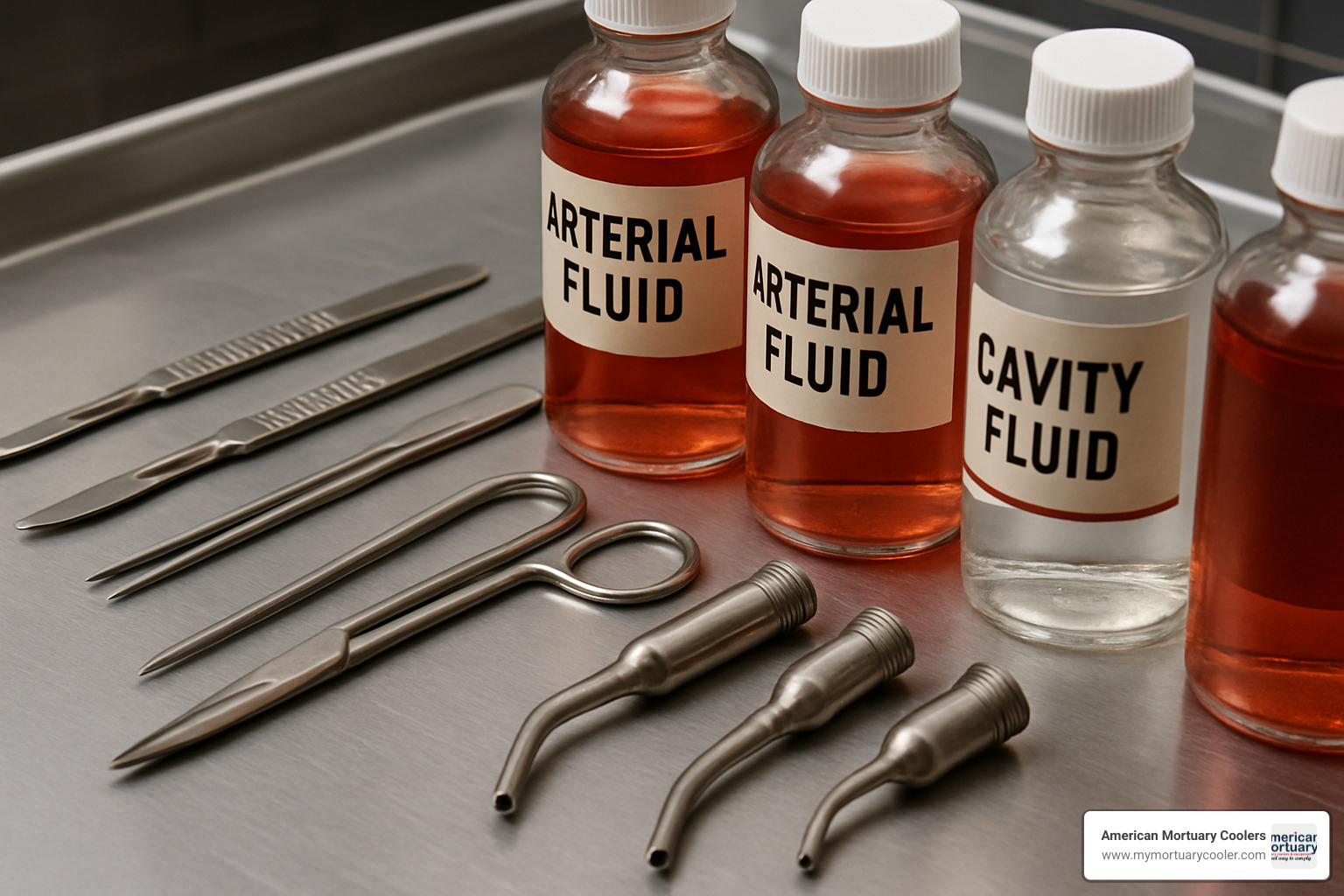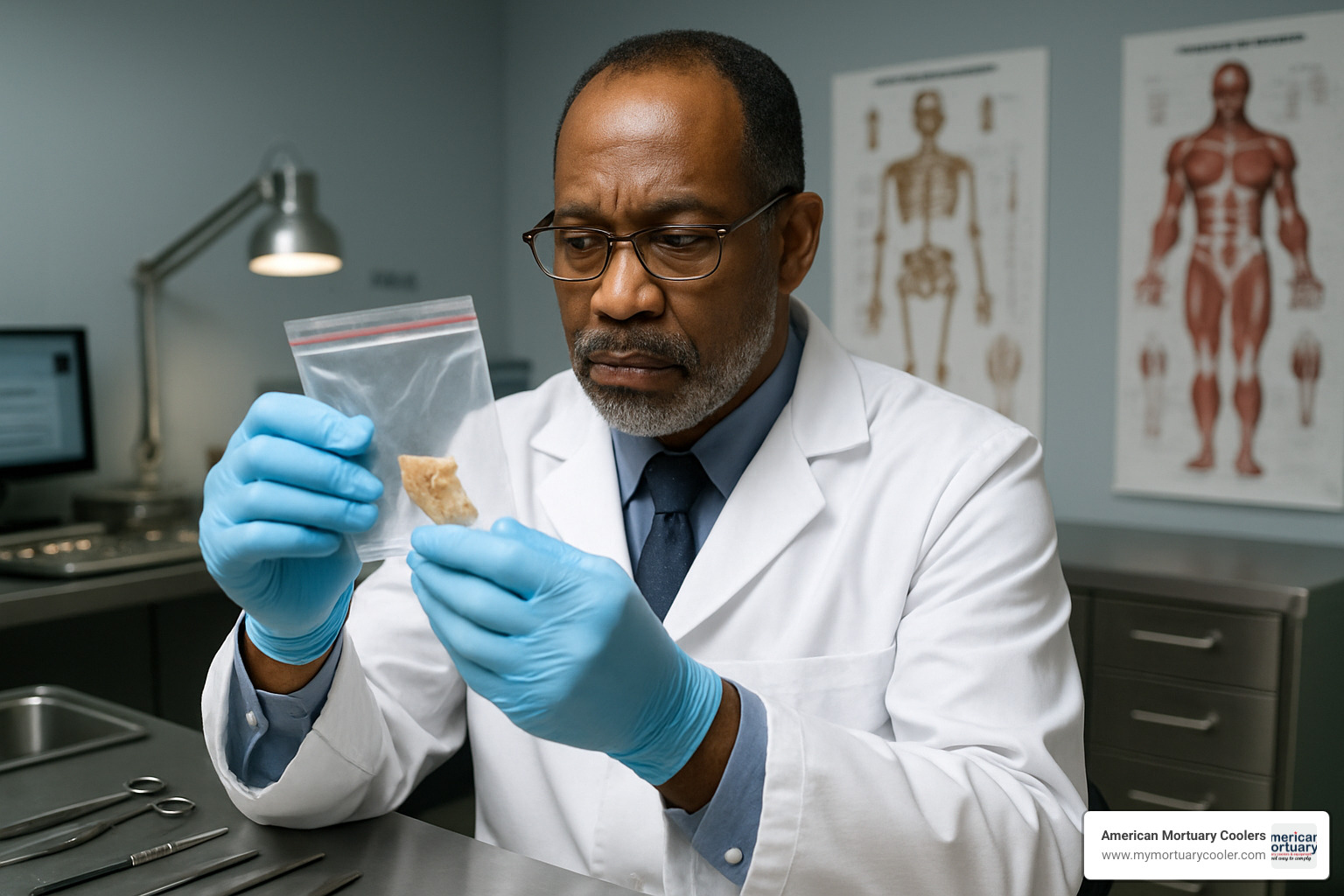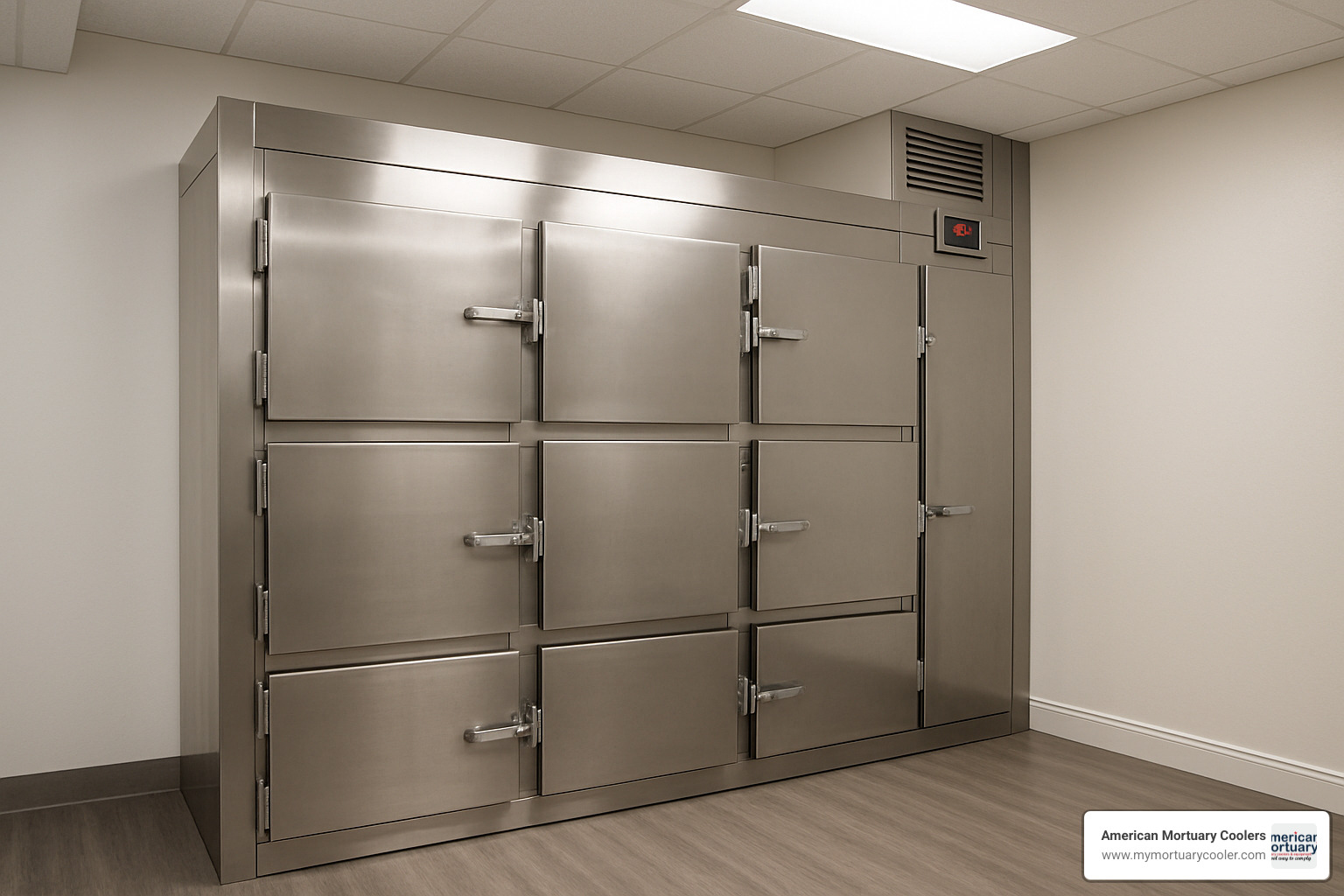
Are Morticians Doctors? Mortician Qualifications Demystified
Understanding Death Care Professionals and Their Roles
Are morticians doctors? No, morticians are not medical doctors. Here's the key difference:
- Morticians: Licensed funeral professionals who prepare bodies, arrange services, and support families
- Doctors: Medical physicians with MD degrees who diagnose and treat living patients
- Medical Examiners: Board-certified forensic pathologists (doctors) who investigate deaths
- Coroners: May or may not be doctors, depending on local jurisdiction requirements
The confusion often stems from overlapping terminology in death care. While morticians work with deceased bodies and need extensive anatomy training, they complete mortuary science programs - not medical school. According to industry data, there are nearly 20,000 licensed morticians in the United States, but they are not considered physicians.
Why does this matter? Understanding these distinctions helps families know who to contact for specific needs. Morticians handle body preparation and funeral arrangements, while medical examiners determine cause of death in legal investigations.
The term "mortician" largely replaced "undertaker" after the Civil War when embalming became widespread. Today, mortician and funeral director are often used interchangeably, though some larger operations maintain separate roles.
As American Mortuary Coolers, we've worked extensively with funeral professionals nationwide and frequently address questions about mortician qualifications versus medical credentials. Our experience supplying mortuary equipment across 48 states has shown us how are morticians doctors remains one of the most common misconceptions in death care.

Simple are morticians doctors glossary:
Are Morticians Doctors? Quick Answer
Let's clear this up right away: Are morticians doctors? Absolutely not. Morticians are licensed funeral professionals, not medical doctors. This confusion happens more often than you'd think, and it's completely understandable why people mix them up.
The difference comes down to licensure and training. Morticians complete mortuary science programs and pass state funeral director exams. Medical doctors? They go through medical school, residency programs, and medical board examinations - a completely different path.
Here's what makes this even more confusing: Scientific research on coroner qualifications shows that most coroners in the United States don't have medical degrees either. The amount of medical training varies wildly from place to place, which adds to the public confusion about who's actually a doctor in death care.
Scope of practice tells the real story. Morticians focus on preparing bodies, arranging funerals, and supporting grieving families. They can't diagnose medical conditions, prescribe medications, or treat living patients. Their expertise lies in embalming, restoration work, and helping families through difficult times.
Why People Ask "Are Morticians Doctors?"
The question "are morticians doctors" keeps coming up for some pretty logical reasons.
Historical terminology plays a big role here. After the Civil War, "undertaker" evolved into "mortician" as embalming became more common. The word "mortician" just sounds more medical than "undertaker," doesn't it? That shift in language made people assume medical training came with the territory.
Media portrayal doesn't help either. TV shows and movies love to blur the lines between different death-care professionals. You'll see fictional morticians doing medical procedures or investigations that would actually be handled by medical examiners in real life.
In smaller communities, things get even murkier. Sometimes the same person wears multiple hats - maybe they're both a funeral director and the county coroner. This creates the impression that these roles need similar qualifications, when they really don't.
Situations Where "Are Morticians Doctors" Overlap with Medicine
While morticians aren't doctors, their work definitely touches on medical knowledge in several important ways.
Body donation requires morticians to coordinate with medical schools and research facilities. When families choose to donate bodies for science, morticians need to understand proper preservation methods and handle all the paperwork correctly.
Autopsy coordination brings morticians and medical professionals together regularly. After a medical examiner or pathologist completes an autopsy, morticians receive the body and must skillfully restore it for viewing when families request it.
Infection control is serious business in mortuary work. Morticians follow strict safety protocols when handling bodies with infectious diseases. They're trained to understand how diseases spread and what precautions to take.
Embalming chemistry might be where morticians come closest to medical knowledge. The embalming process requires detailed understanding of human anatomy, how the body works, and chemistry. Morticians must know how different chemicals interact with body tissues and adjust their techniques based on factors like cause of death and timing.
Education & Training: Mortuary Science vs Medical School
When people wonder are morticians doctors, the biggest clue lies in their completely different educational journeys. Think of it like comparing a skilled carpenter to an architect - both work with buildings, but their training paths couldn't be more different.
Mortuary science programs focus on the practical skills needed for funeral service. Students spend their time learning anatomy and physiology, but with a specific focus on body preparation after death. They master embalming techniques, study the chemistry of preservation, and learn restorative art to help families say goodbye with dignity.
The coursework includes grief counseling, business management, and funeral law - subjects you'd never find in medical school. Students also spend significant time in embalming labs working with actual human remains, gaining hands-on experience that's crucial for their future careers.
Most mortuary science programs take 2-4 years to complete, followed by a required apprenticeship period. This supervised experience typically lasts 1-3 years, depending on state requirements. It's during this time that new graduates learn the business side of funeral service while perfecting their technical skills.
According to recent data, tuition for mortuary science averages $12,340 for undergraduate programs and $22,415 for graduate programs. That's a fraction of medical school costs, reflecting the shorter duration and different focus of the education.
For those considering this career path, more info about a Mortuary Science Bachelor's Degree provides detailed guidance on program selection and requirements.
Medical school, on the other hand, is an entirely different beast. Future doctors spend 4 years studying every aspect of human health and disease, followed by 3-7 years of residency training. They learn to diagnose illnesses, prescribe treatments, and perform medical procedures on living patients.
Medical students complete clinical rotations in hospitals, working directly with patients under supervision. After graduation, they must pass rigorous state board examinations and maintain their licenses through extensive continuing education focused on medical advances and patient care.
More than thirty states offer mortuary science programs, and licensing requirements are surprisingly consistent across the country. Most states require completion of an accredited program, successful apprenticeship, and passing a state examination. This standardization helps maintain professional standards while being far less complex than medical licensing.
Both professions require continuing education, but the focus differs dramatically. Morticians stay current on new embalming techniques, funeral industry trends, and grief counseling methods. Doctors focus on medical research, treatment advances, and patient safety protocols.

The bottom line? While both morticians and doctors work with human bodies and need extensive training, their educational paths serve completely different purposes. Morticians become experts in death care and family support, while doctors focus on healing and treating the living.
Mortician, Funeral Director, Undertaker—Same or Different?
Understanding these titles helps clarify why people ask are morticians doctors and reveals how the profession has evolved over time.
Modern Usage: In today's funeral industry, "mortician," "funeral director," and "undertaker" are largely interchangeable terms. However, subtle distinctions exist:
Historical Evolution:
- Undertaker: The original term, dating back centuries, referring to someone who "undertook" the responsibility of burial arrangements
- Mortician: Emerged after the Civil War when embalming became widespread, suggesting more scientific and medical knowledge
- Funeral Director: The most common modern term, emphasizing the business and service coordination aspects
Role Responsibilities:
- Body Preparation: Embalming, dressing, cosmetic restoration, and positioning for viewing
- Business Management: Coordinating services, managing facilities, handling financial arrangements
- Grief Counseling: Providing emotional support and guidance to bereaved families
- Legal Compliance: Obtaining death certificates, burial permits, and ensuring regulatory compliance
| Title | Primary Focus | Era | Medical Training Required |
|---|---|---|---|
| Undertaker | Basic burial arrangements | Pre-1900s | None |
| Mortician | Body preparation/embalming | 1900s-present | Mortuary science only |
| Funeral Director | Service coordination | 1950s-present | Mortuary science only |
Size Matters: In smaller funeral homes, one person typically handles all responsibilities. Larger operations may separate roles, with some staff focusing on embalming while others manage family services and business operations.
Coroner & Medical Examiner vs Mortician
Here's where the confusion about are morticians doctors gets really interesting. The death investigation world has several different professionals, and understanding who's who can clear up a lot of misconceptions.
Medical examiners are the doctors in this equation. They're board-certified forensic pathologists who spent 13 to 15 years in medical training after high school. These folks have medical degrees, completed residencies, and specialized in forensic pathology. When someone dies under suspicious circumstances, medical examiners determine the cause and manner of death through autopsies and scientific investigation.
Coroners, on the other hand, might surprise you. According to scientific research on medical examiner systems, many coroners have no medical education or certification whatsoever. In fact, some states allow anyone to run for coroner as long as they meet basic residency requirements. You could literally have a plumber serving as your county coroner.
This creates a fascinating patchwork across America. Some coroners are medical doctors, others are funeral directors, and some have completely different backgrounds. The requirements vary dramatically depending on where you live and what resources your local government provides.
Government appointment versus election makes a big difference too. Medical examiners are typically appointed by government agencies based on their medical qualifications. Coroners are often elected positions, which means voters choose them regardless of medical training. Some coroners have arrest authority and can investigate deaths like law enforcement officers.
Morticians enter the picture after the investigation wraps up. Once the medical examiner or coroner releases the body, that's when morticians take over. They handle body preparation, coordinate with families, and manage funeral arrangements. Their mortuary science training focuses on embalming, restoration, and service provision rather than determining how someone died.
The chain of custody flows logically: first responders secure the scene, then coroners or medical examiners investigate the death, and finally morticians prepare the body for burial or cremation. This separation of roles explains why morticians don't need medical degrees - they're not making medical determinations about death.
Public health considerations also play a role. Medical examiners often work with epidemiologists and public health officials when deaths might indicate broader health threats. Morticians focus on individual family needs and proper body handling rather than population-level health concerns.

At American Mortuary Coolers, we work with funeral homes across 48 states and see how these different systems operate. Some areas have well-funded medical examiner offices with state-of-the-art equipment, while others rely on part-time coroners who call in outside pathologists when needed. Understanding these differences helps funeral directors know who they'll be working with and what to expect in the body release process.
Frequently Asked Questions about "Are Morticians Doctors?"
We get these questions all the time at American Mortuary Coolers. After delivering mortuary equipment across 48 states, we've heard just about every question families and students have about funeral professionals. Let's clear up the most common confusion points.
Death certificates often spark questions because morticians handle the paperwork, but they can't actually complete the medical sections. Only licensed physicians, medical examiners, or authorized coroners can certify the cause of death. Think of morticians as the helpful coordinators who make sure families get the certificates they need for legal purposes.
Career crossover does happen occasionally. Some people pursue both mortuary science and medical careers, but these are completely separate paths with different licensing requirements. It's like being both a chef and an accountant - possible, but requiring two distinct skill sets.
Regional rules vary quite a bit depending on where you live. What stays the same everywhere? Are morticians doctors? The answer is still no, whether you're in Tennessee, California, or anywhere else in the country.
Do morticians ever become medical examiners?
This is actually more common than you might think, though it requires serious dedication. A mortician who wants to become a medical examiner faces a long educational journey.
They need to complete medical school (4 years), then an anatomical pathology residency (4 years), followed by a forensic pathology fellowship (1 year). After that, they must pass rigorous board certification examinations.
That's 9 additional years of medical training beyond their mortuary science education. Some morticians have made this transition successfully, but they're essentially starting over with a completely new career in medicine. It's quite an undertaking, but shows how some professionals bridge both worlds.
What certifications must morticians hold?
Every mortician needs state licensing, which involves several steps. They must complete a mortuary science degree from an accredited program, then work through 1-3 years of apprenticeship under a licensed funeral director. The apprenticeship varies by state - some require just one year, others want three.
Next comes testing. Morticians take the National Board Examination (NBE) plus state-specific licensing examinations. It's thorough preparation for the responsibilities they'll handle.
Continuing education keeps licenses current. Most states require 10-20 hours of ongoing education annually. This covers new techniques, legal updates, and industry developments.
Some morticians pursue additional specialized certifications in areas like advanced embalming techniques, grief counseling, pre-need sales, or crematory operations. These aren't required everywhere but show professional commitment.
How do requirements vary by state or country?
United States variations can be surprising. Some states accept 2-year associate degrees in mortuary science, while others require full 4-year bachelor's degrees. Apprenticeship requirements range from 1-3 years depending on your state. All states require testing, but the specific examinations and passing scores differ.
International differences are even more dramatic. Canada typically requires 5-year programs that combine education and apprenticeship. The United Kingdom has different qualification systems with varying regional requirements. Australia uses state-based licensing with multiple educational pathways.
Here's the consistent factor no matter where you go: morticians are not medical doctors. Whether you're asking "are morticians doctors" in Nashville, Toronto, or Sydney, the answer remains the same. The roles, training, and responsibilities are distinct across the globe.

Conclusion
The answer to "are morticians doctors?" is definitively no, but understanding why this question arises helps clarify the important roles different death-care professionals play. Morticians are highly trained funeral service professionals who complete specialized mortuary science education, not medical school.
At American Mortuary Coolers, we've spent years working with funeral professionals across all 48 contiguous states, from our locations in Tennessee, Georgia, Illinois, and beyond. Our experience delivering custom mortuary coolers to funeral homes nationwide has given us deep insight into the profession's requirements and challenges.
Key Takeaways:
- Morticians complete mortuary science programs, not medical school
- Medical examiners are the doctors in death care - they're forensic pathologists
- Coroners may or may not be doctors, depending on local requirements
- All three roles serve important but distinct functions in death care
Why This Matters: Understanding these distinctions helps families steer difficult times by knowing who to contact for specific needs. It also helps those considering careers in death care understand the different educational pathways available.
Our Role: As specialists in mortuary equipment, we support funeral professionals with the tools they need to serve families with dignity and respect. Our custom coolers and equipment help morticians maintain proper body preservation while they coordinate services and support grieving families.
Whether you're a family seeking services, a student considering mortuary science, or a professional in the field, morticians are skilled, licensed professionals who play a vital role in death care - they're just not medical doctors.
For more information about mortuary services and the professionals who provide them, visit our resource on understanding mortuary services.
The death-care industry relies on dedicated professionals working together - from the medical examiners who investigate deaths to the morticians who help families say goodbye. Each role requires specific training and serves essential functions in helping communities process loss and honor the deceased.



